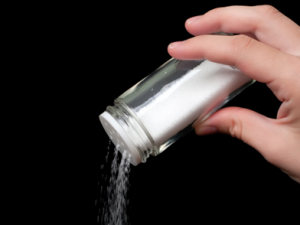What Should You Look For In A Prenatal Supplement?
Author: Dr. Stephen Chaney
 You want to do the best for your unborn child. So, you try to find the best prenatal supplement. You may ask your doctor to recommend a prenatal supplement. You may ask your best friend what supplement she used when she was pregnant. Or perhaps you scan online reviews of prenatal supplements by random dietitians or nutrition gurus to select the “best” prenatal supplements.
You want to do the best for your unborn child. So, you try to find the best prenatal supplement. You may ask your doctor to recommend a prenatal supplement. You may ask your best friend what supplement she used when she was pregnant. Or perhaps you scan online reviews of prenatal supplements by random dietitians or nutrition gurus to select the “best” prenatal supplements.
Then you read the supplement label or the company’s website and see claims like:
- “Supports optimal nutrition before, during, and after pregnancy”
- “Packed with 16 nutrients to support fetal development, immunity, energy metabolism, and more”
- “Concise prenatal formula supports both bone and brain development”
It sounds so good. You think you have found the perfect prenatal supplement. “Right?”
Perhaps not. A recent study (JB Adams et al, Maternal Health, Neonatology, and Perinatology, 8:4, 2022) did an in-depth review of prenatal supplement recommendations and how well prenatal supplements on the market met those recommendations.
The results were not encouraging. The authors concluded, “[Our] analysis found that prenatal supplements vary widely in content, often only contain a subset of essential vitamins, and the levels were often below…recommendations.”
In other words, their study found that most prenatal vitamins may not be adequate to support your needs and the needs of your child through pregnancy and breastfeeding.
I know this is likely to be a topic of great concern for many of you. So, I will examine the study in detail and give you some guidelines for selecting the perfect prenatal supplement.
How Was This Study Done?
 This study can be divided into two parts.
This study can be divided into two parts.
#1: What Should The Ideal Prenatal Supplement Contain:
The authors started off by reevaluating the optimal recommendations for prenatal supplements. They reviewed over 200 articles, focusing on articles that:
- Provided insight into optimal dosage [of essential nutrients] such as treatment studies on the effects of different doses on outcomes and biomarkers.
- Were larger, more rigorously designed, such as randomized double-blind placebo-controlled studies.
The studies included in their review fell into three categories:
- The association of low levels of vitamins with health problems [during pregnancy and in the child after birth].
2) Studies on the changes in [blood] vitamin levels during pregnancy [when the mother is either] un-supplemented or supplemented (The blood level of many vitamins decreases dramatically during pregnancy without supplementation).
3) Clinical trials on the effect of vitamin supplementation on health problems [during pregnancy].
They used these data to create their recommendations for what an ideal prenatal supplement should contain. In some cases, their recommendations were higher than current RDA recommendations for pregnant women.
#2: How Do Currently Available Prenatal Supplements Compare With Their Recommendations For The Ideal Supplement?
For this part of the study, they created a comprehensive list of the nutrients provided by 188 prenatal supplements currently on the market using databases created by the National Institutes of Health. Where these databases were outdated, the nutrient list for that supplement was updated using information on the manufacturer’s websites or labels on retail websites such as Amazon.
Finally, they compared the nutrient content of all 188 prenatal supplements with their recommendations for the ideal prenatal supplement.
Is Your Prenatal Supplement Adequate?
 There are four points I wish to make before I review the results of this study.
There are four points I wish to make before I review the results of this study.
- I suspect you are most interested in finding out how prenatal supplements on the market compare with their recommendations for an ideal supplement, so that is what I will discuss below.
2) As I mentioned above, some of their recommendations exceed the current Daily Value (DV) recommendations for pregnant and lactating women. I will point that out whenever it significantly affects the comparisons.
3) The authors of this article made the point that most women going on a prenatal supplement will probably discontinue taking their multivitamin supplement. Thus, their recommendations included nutrients commonly included in multivitamin supplements. This is a valid point, and something you should consider when choosing a prenatal supplement. However, in my discussion below I will focus on the nutrients that are universally recognized as important for pregnancy and lactation.
4) The authors focused on prenatal supplements that had less than the recommended amount of essential nutrients. They did not ask how many of those supplements had excessive amounts of certain nutrients. In my non-systematic review of prenatal supplements, I found several that had doses of some nutrients in thousands of percent of the DV recommendations. In my opinion, this is potentially unsafe for pregnancy and nursing. I will cover this topic in more detail in my discussion.
With that in mind, here are the results of their review.
Vitamins:
When you look at vitamins that have long been recognized as essential for pregnant women, the results are encouraging:
- Vitamin D, folate, vitamin B12, and vitamin B6 are found in adequate amounts compared to the DV in most prenatal supplements.
However, when you look at nutrients that have more recently been recognized as essential for pregnant women, the story is very different:
- For vitamin K only 31% of prenatal supplements contain vitamin K and only 16% meet or exceed their recommendation for vitamin K.
-
- Their recommendation (90 mcg/day) is identical to the DV for vitamin K. So, there is no doubt that most prenatal supplements do not provide adequate amounts of vitamin K.
- For choline only 40 % of prenatal supplements contain choline and only 2% meet or exceed their recommendation for choline.
-
- Their recommendation (350 mg/day) for choline is less than the 450 mg/day recommended by the NIH and the American College of Obstetricians and Gynecologists.
-
- The average prenatal supplement only provides 25 mg of choline, which is wildly inadequate by any standard.
- For DHA only 42% of prenatal supplements contain DHA and only 1% meet or exceed their recommendation for DHA.
-
- Their recommendation (600 mg/day) for DHA is higher than the 200 – 300 mg/day recommended by the most health organizations.
-
- However, the average prenatal supplement only provides 94 mg of DHA, so even at 200 – 300 mg/day a substantial percentage of prenatal supplements do not provide adequate amounts of DHA.
Minerals:
 This study did not consider minerals, so I will draw on another source to estimate the adequacy of minerals in prenatal supplements.
This study did not consider minerals, so I will draw on another source to estimate the adequacy of minerals in prenatal supplements.
Three key minerals for a healthy pregnancy are iron, calcium, and iodine (Yes, I realize that iodine is not a mineral, but it is usually listed with the minerals on supplement labels. And it is also essential for a healthy pregnancy). Fortunately, another recent study (LG Saldanha et al, Journal of the American Academy of Dietetics, 117: 1429-1436, 2017) looked at the adequacy of these nutrients in 214 prenatal supplements. This study found:
- The iron DV for pregnant and lactating women is 27 mg/day and 95% of prenatal supplements contained iron at the recommended level.
- The calcium DV for pregnant and lactating women is 1,300 mg/day. A high percentage (91%) of prenatal supplements contain calcium, but many prenatal supplements only provide 100-200 mg of calcium. That is far less than the DV.
- The situation for iodine is even more alarming. Only 50% of prenatal supplements contain iodine. And for those that do contain iodine, the average iodine content is only 150 mcg (The DV for pregnant and lactating women is 290 mcg/day).
It is no wonder the authors of these two studies concluded that most prenatal supplements on the market do not provide adequate amounts of all the nutrients needed for a healthy pregnancy. The shortfalls are particularly acute for vitamin K, choline, DHA, iodine, and calcium.
What Should You Look For In A Prenatal Supplement?
 By now you are probably wondering how you know a good prenatal supplement from a bad one. Here are six simple rules for choosing the ideal prenatal supplement.
By now you are probably wondering how you know a good prenatal supplement from a bad one. Here are six simple rules for choosing the ideal prenatal supplement.
- Don’t rely on health “gurus” to choose your prenatal supplement for you. I did a little “sleuthing” for you. I searched the internet for websites claiming to have identified the “best” prenatal supplements. I checked out the supplements they recommended, and here is what I found:
- The supplements the gurus recommended checked all the boxes in that they had some of all the nutrients required for a healthy pregnancy.
- However, the amount of those nutrients ranged from lows of 10-20% of the DV for pregnant and lactating women to thousands of percent of the DV for others.
- In other words, they contained grossly inadequate levels of some nutrients and potentially toxic levels of others.
2) Don’t believe label claims or claims made on the manufacturer’s website. Remember the claim, “Concise prenatal formula supports both bone and brain development”, that I mentioned at the beginning of this article? The supplement associated with that claim had only 100 mg of calcium and no DHA. It is hard to imagine a supplement like that supporting either bone or brain health. The claim was bogus.
3) Don’t assume your doctor’s recommendation is the ideal prenatal supplement. A recent study (LG Saldanha et al, Journal of the American Academy of Dietetics, 117: 1429-1436, 2017) compared prescription (the kind your doctor is likely to prescribe) and non-prescription prenatal supplements. It found:
- Compared with non-prescription supplements, prescription supplements contained significantly fewer vitamins (9 versus 11) and minerals (4 versus 8).
- While prescription supplements contained more folic acid than non-prescription supplements, they contained significantly less vitamin A, vitamin D, iodine, and calcium.
4) Look for a prenatal supplement containing all the essential nutrients, not just those important for a healthy pregnancy. The authors of the first study made the point that most women will stop taking their regular multivitamin when they start their prenatal supplement. If that is you, your prenatal supplement should contain the nutrients you were getting from your multivitamin.
5) Look for a prenatal supplement that provide 100% of DV for all nutrients except the bulky ones. The ideal prenatal supplement should contain 100% of the DV for pregnant and lactating women for all essential nutrients. Avoid supplements with very low amounts of some nutrients and large excesses of others.
- Bulky nutrients like calcium, magnesium, and choline are exceptions. It would be hard to get 100% DV for those nutrients in any supplement you could swallow.
6) Look for a prenatal supplement that “fills the gap” for bulky nutrients.
- Fortunately, the NIH has estimated how much of these nutrients the average American woman gets in her diet. That allows us to estimate how much the average woman needs to get from her prenatal supplement to bring her total intake up to the DV for pregnant and lactating women. That amounts to 458 mg for calcium, 166 mg for magnesium, and 272 mg for choline.
-
- That gives you a reasonable benchmark for assessing whether a prenatal supplement is providing enough of those important nutrients. When you read their labels, you will find most prenatal supplements are woefully inadequate for these nutrients.
-
- You also need to ask whether your diet is “average”. For example, the average American gets 72% of their calcium from dairy foods. If you do not consume dairy, you may need to get more calcium from your supplement.
7) Avoid the excesses. Your unborn baby is precious. You don’t want to expose it to potentially toxic doses of vitamins or minerals. Avoid any prenatal supplement containing thousands of percent of the DV for some nutrients. And I would recommend caution with supplements containing over 200% of the DV for some nutrients if you are taking other supplements that may provide the same nutrient(s).
The Bottom Line
Two recent studies have surveyed hundreds of prenatal vitamins and asked whether they provided adequate amounts of the nutrients that are essential for a healthy pregnancy. The results were shocking.
- While most prenatal supplements provided adequate amounts of folic acid, vitamin B12, vitamin B6, vitamin D, and iron…
- They were woefully inadequate for vitamin K, calcium, choline, iodine, and DHA – all nutrients that are essential for a healthy pregnancy.
- Furthermore, prescription prenatal supplements (the kind your doctor is likely to prescribe) were no better than non-prescription supplements.
The authors of the first study concluded, “[Our] analysis found that prenatal supplements vary widely in content, often only contain a subset of essential vitamins, and the levels were often below…recommendations.”
In other words, their study found that most prenatal vitamins on the market may not be adequate to support your needs and the needs of your child through pregnancy and breastfeeding.
For more details on this study and my discussion of how you can select the ideal prenatal supplement for you and your unborn child, read the article above.
These statements have not been evaluated by the Food and Drug Administration. This information is not intended to diagnose, treat, cure, or prevent any disease




